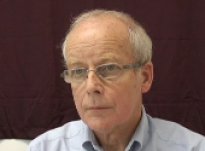George

George was prompted by his GP to have a PSA test while at surgery for a cholesterol test. He was then referred to hospital for a biopsy the result of which led to a diagnosis of prostate cancer at end of 2007. He had a radical prostatectomy in April 2008.
George is a retired material engineer in the oil and gas industry, married with two children. His ethnic background is White British.
More about me...
George was diagnosed with prostate cancer at the end of 2007 after his doctor suggested a PSA test alongside a cholesterol test. His initial test score was 7.5 and a subsequent raised PSA level led to his doctor referring him to hospital for a biopsy and an MRI scan in early 2008. There he was diagnosed with a less aggressive prostate cancer and he had a full range of treatment available to him including radical prostatectomy, brachytherapy and external beam radiation. He decided to have a radical prostatectomy as he wanted the cancer out of his body and felt this was the quickest way to do it. He had the operation in April 2008. While after the surgery his PSA level was negligible it slowly began to rise during 2008-2009 and he was advised to have radiotherapy. While he was initially reluctant to have radiotherapy, viewing it as ‘a last chance saloon’ he eventually had this treatment in early 2010. He is currently having yearly checkups and his PSA is once again negligible. Prior to being diagnosed he didn’t know neither anything about the PSA test nor of prostate cancer and to begin with found it to be very depressing but with family support managed to get over that. He feels fortunate that his prostate cancer was diagnosed early and feels that there should be a national screening programme for prostate cancer.
Interview conducted in 2011 by Anne Montgomery.
When he was diagnosed with cancer George felt a sense of disbelief. Then he became depressed.
When he was diagnosed with cancer George felt a sense of disbelief. Then he became depressed.
After diagnosis, I was still working at the time, I was sixty-five, excuse me, (coughs) I was sixty-five, my plan was to work for two years in addition to that, and put money away for my old age and all that, and when I was diagnosed with this I thought “Well I can’t do that now”, you know, and I would say, the initial, reaction was one of disbelief, “this is not happening to me, I can’t have cancer, I don’t have it”. I started from that particular point, I think to think too much, I was still working and I went to work but I could hardly get out of bed, in the morning, and that’s never been my problem, I’ve always wanted to work, even now I’d like to go back to work, but then it really sort of hits you like a ton of bricks, that it’s not a sticking plaster job, this is a serious operation.
After surgery George did not have serious side effects, but he found that he did not have an erection as often as he used to and he occasionally needed Cialis (tadalafil), prescribed by his GP.
After surgery George did not have serious side effects, but he found that he did not have an erection as often as he used to and he occasionally needed Cialis (tadalafil), prescribed by his GP.

